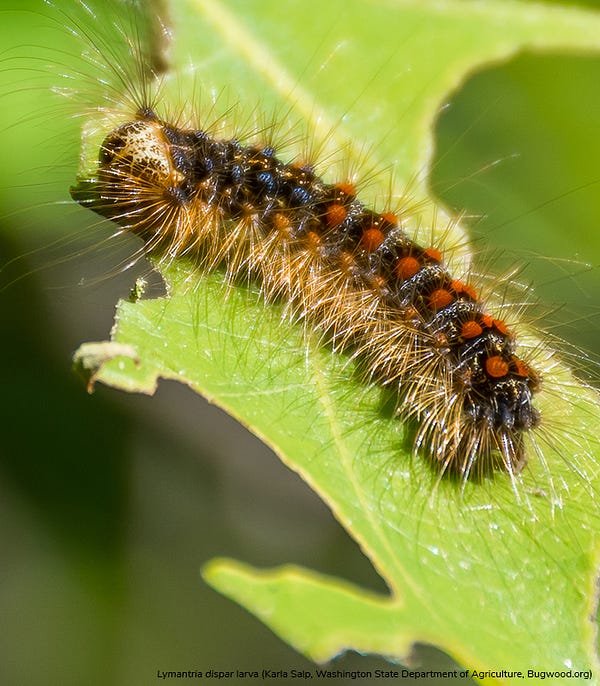Cultivating Cultural Amnesia
The promotion of a woke vocabulary aims to make us forget where we come from and what we achieved
“The past was erased, the erasure was forgotten, the lie became the truth.” -― George Orwell.
Throughout my life, I never for once imagined that one day I would be writing about the rights and wrongs of the names that we give to plants and insects. That was before the campaign to alter and erase our vocabulary reached such ridiculous proportions that virtually any name or noun can now become the target of semantic engineering. In recent years the crusade to decolonise our language has intruded into the domain of nature. The language police carefully examine the names of plants, insects and animals to see if they are suitable for decolonisation.
The project of altering the names of plants is advocated with a zealous ideological conviction by Dr Brett Summerell, the chief scientist of the Australian Institute of Botanical Science. Summerrell decried the fact that the ‘names of effectively all Australian plants were defined by white – primarily male – botanists’. He observed that many plants were ‘named using Latinised terms to describe features or locations, and a number are named after (usually white male) politicians or patrons’. As an illustration of the problem of allowing white male scientists to give plants a name, Summerrell points to the plant genus Hibbertia, named after George Hibbert, a man who made his fortune from slave trading’.
Hibbertia
Others object to the names of animals linked to individuals who affront their sensibility. From their standpoint, ‘decolonising’ the names of species is no less important than toppling over the historical statues of figures from the past that they decry. According to one account, species names are far too often enmeshed with colonialism, paternalism, sexism and racism. The journalist John R. Platt pointed out that the small bright North American bird, the Townsend warbler, was named Setophaga townsendi by the American naturalist John Kirk Townsend[. Since Townsend was implicated in developing 19th-century scientific racism, a new name for the little warbler must be found.
Is there any point in changing the name Setophaga townsendi? Decolonisation advocates believe it is essential to detoxify the name of this bird. They assert that ‘just like toppling statues in Bristol Harbour or removing Cecil Rhodes’ name from public buildings, renaming things is important and necessary if we are to right history’s wrongs’.
Setophaga townsendi
It is unlikely that past wrongs can be fixed through the semantic re-engineering of the taxonomy of nature. One needs to be a zealous grievance archaeologist to feel slighted by the name given to a plant two centuries ago. Obsessing about the names of plants and animals has more to do with the project of finding new issues about feeling offended by woke moral entrepreneurs than with liberating a plant from being associated with a name invented by an imperialist scientist. This sentiment is echoed by the 10-year manifesto published by London’s Kew Gardens. Its five key priorities include ‘having honest conversations about its links to imperialism and colonialism, and helping to tackle the biodiversity crisis’ .That’s another way of saying that Kew will do its best to expose as many examples of imperialist misdeeds from the world of plants as possible to demonstrate its commitment to the cause of decolonising its collection. The head of Kew Gardens, Richard Deverell, has vowed to decolonise this institution. He stated that there is ‘no acceptable neutral position’ on the history of colonialism and racism.
Deverell is absolutely right to argue that it is morally wrong to adopt a neutral position on the history of colonialism and racism. But his call to decolonise Kew has little to do with history. As is the case with all examples of grievance archaeology, it is about condemning contemporary western society by blaming it for the behaviour of imperialist biologists two centuries ago. In effect, Deverell has decided that Kew should take the knee to demonstrate that this institution is ‘on the right side of history’. When gardens and plants become the target of politicisation, it is evident that what’s at issue are matters external to what’s going on inside Kew. In a world where grievance archaeology has become a growth industry, it was only a matter of time before the naming of plants was brought into the frame.
Placing the taxonomy of plants and animals under a linguistic microscope is a project vigorously pursued by practitioners of grievance archaeology. Grievance archaeologists examine names and words that cause them offence with a view to cancelling them. At times their zealous commitment to finding offence acquires the form of a self-caricature. Take the example of the Gypsy Moth – a pesky insect that chews through the leaves of trees. It is unlikely that normal human beings feel offended by the term Gypsy Moth. As I noted in a previous post , just in case someone might have a grievance using this term, the Entomological Society of America (ESA) has decided to ‘remove’ it from its list of approved names[.
Evidently, the ESA has decided it also wants to have an ‘honest discussion’ with history. To demonstrate that it is on the right side of history, it has launched a review into insect names that ‘may be inappropriate or offensive’.



From now on, the Gypsy moth will be identified by that widely known and popular term, Lymatria dispar! Predictably the term Gypsy Ant has also been abolished just in case it causes psychological damage to a member of the Roma community. So, get ready to use the term Aphaenogaster araneoides in its place[ix]. And there is more to come. The ESA has asked the public to help draw any potentially offensive insect names to its attention. How long before the Asian Needle Ant or the West Indian Weevil disappears from the public view?
The ESA has also mobilised experts to assist its new cause. Its Better Common Names project will put together working groups that include experts who study the species and people from the insect’s native regions to decide on a new offence-free appellation[x].
It appears that the experts are more than delighted to sign up to join the language police. Terry McGlynn, the entomologist who named the ant species and has since recognized that he was on the wrong side of the angels, said on Twitter that the decision to replace the name is ‘great news.’ ‘We’re professionals, trying to advocate for entomology,’ stated McGlynn to Caroline Anders of the Washington Post. ‘We don’t have to insult people in the process.’


Some of us who believed that the term ‘gypsy’ conveyed the connotation of a free and nomadic individual will be surprised to discover that the ESA considers it a racial slur. But we live in a world where from one day to the next, the language police can decide that we can no longer refer to the Oriental Rat Flea and not even to the Norway Rat Flea!
Cultivating Cultural Amnesia
The taxonomy of nature is the latest battleground in the culture wars, with potentially offensive names cancelled. While this seems ridiculous, it’s just one more step towards thought control by dictating what can and cannot be said.
We live in a world where the renaming of insects and plants has converged with the wider drive to re-engineer concepts and terms. Changing names and words have acquired its own inner dynamic. It enjoys the official approval of the Biden Administration in the United States. Last year, the Administration’s Secretary of the Interior, Deb Haaland, established a process to review and replace derogatory names of America’s geographic features[. She also declared ‘squaw’ a derogatory term and ordered the Board on Geographic Names – the federal body tasked with naming geographic places – to implement procedures to remove the term from federal usage. The U.S. Department of the Interior now boasts that it has removed ‘Sq…..’ from Federal usage]. The Department promises to re-examine geographical places with derogatory connotations and will fight to rename them
In principle, it is entirely understandable that place names and other forms of nomenclature are renamed due to local pressure or by new historical circumstances. However, there is something deeply disturbing when renaming acquires its own dynamic and becomes an ideological movement always looking for more targets to rebrand. Renaming has become its cause, and its targets are far more culturally significant than nit-picking over esoteric plants and insects. Advocates of transgenderism are determined to abolish the distinction between boy and girl, man and woman, mister and miss. To realise this objective, they have not just renamed words but invented their own vocabulary. They have been remarkably successful in gaining official recognition for their project. Take the example of the recently published revised edition of the Judicial College Equal Treatment Book. It provides a striking illustration of how leading members of the British Judiciary have become zealous advocates for the adoption of a new gender-neutral language. This publication exhorts members of the judiciary to use ‘gender-neutral language where possible, e.g., “businessperson” not “businessman”, “postal operative” not “postman”, “flight attendant” not “air hostess”, “chair” not “chairman”’.
The Equal Treatment Book has thoroughly internalised trans-genderist ideology and the vocabulary recently invented by activists associated with this movement. It instructs judges to use the preferred personal pronouns of transgender people’. It warns: ‘Be alert to issues about how someone prefers to be addressed: showing respect for a person’s gender identity includes using appropriate titles (Mr/Ms) and personal pronouns (he/him/his; she/her/hers). Some trans people prefer gender-neutral terminology (Mx/they/them/theirs), which should be accommodated if that is known’[.
The project of displacing the male/female distinction with gender-neutral language is promoted through some of the most grotesque examples of the re-engineering of language. When the word ‘woman’ is replaced by ‘menstruating person’, ‘mother’ gives way to a ‘parent who gives birth’, ‘breastfeeding’ becomes ‘chestfeeding’, or ‘pregnant women’ is reframed as ‘pregnant people’, a new reality is well under construction. Something has seriously gone wrong when the leading medical journal, the Lancet, decided to call women ‘bodies with vaginas’.
The ease with which Anglo-American society has accommodated the transformation of language indicates how a powerful mood of moral confusion has engulfed its institutions. What’s at issue is not just a matter of words but also thought. The project of altering language is not simply about what words can and cannot be used. The new regime of renaming and policing language aims to influence people's thinking. Erasing the word ‘women’ and replacing it with ‘bodies with vaginas’ is not simply a matter of words. It bears directly on what it means to be a woman and indirectly on what it means to be a man.
The ultimate aim of the movement to rename is to replace the concepts and ideals that have emerged during the course of history with a worldview that is profoundly hostile to the cultural accomplishments of the past. They offer a total package – from the name of plants to the appellation of the biological sexes. They don’t just want to get rid of the S-word but also the W-word.
If successful, targeting language will create a condition of cultural amnesia. Deprived of the vocabulary organically linked to the evolution of culture, people will forget many assumptions that have given meaning to people’s lives over the centuries. As George Orwell reminded us, ‘without memory, the people cannot know the past’. And without a sense of the past, society is bound to lose its way.
One final point. You can rename as much as you want, but it will not change the past or correct the wrongs in the past. However, cultural amnesia will set in once renaming achieves a critical mass. It will detach people from their past to the point that they will struggle to remember where they come from and who they are.






